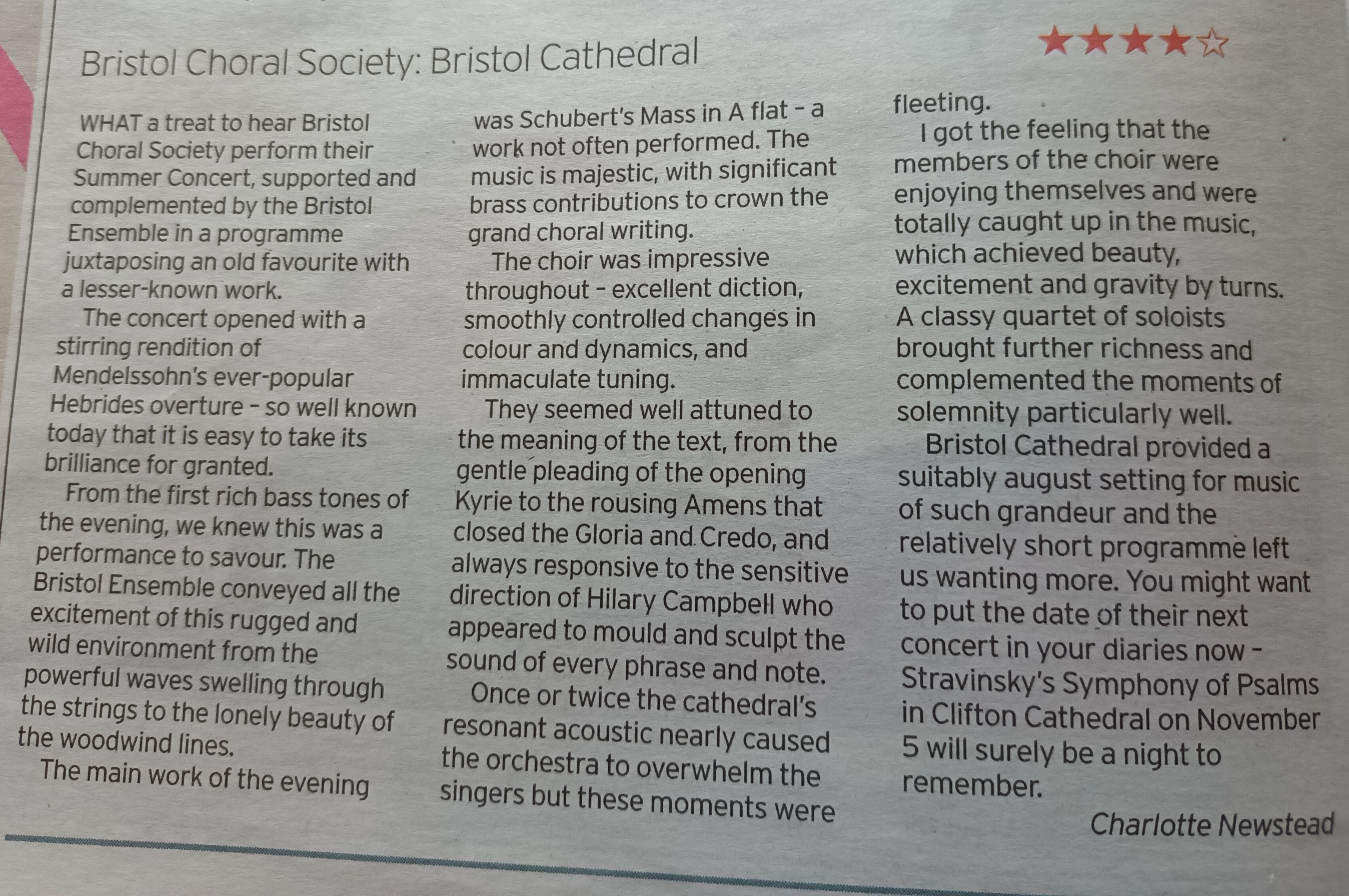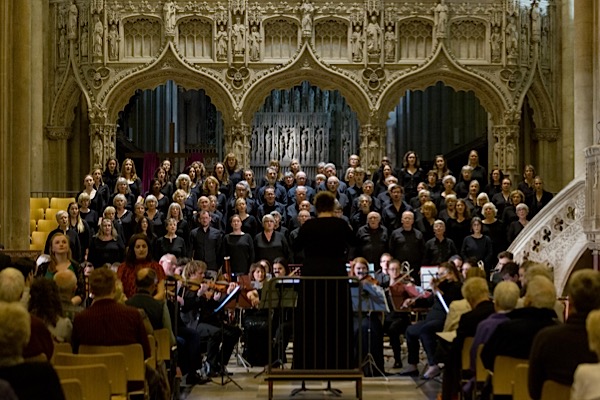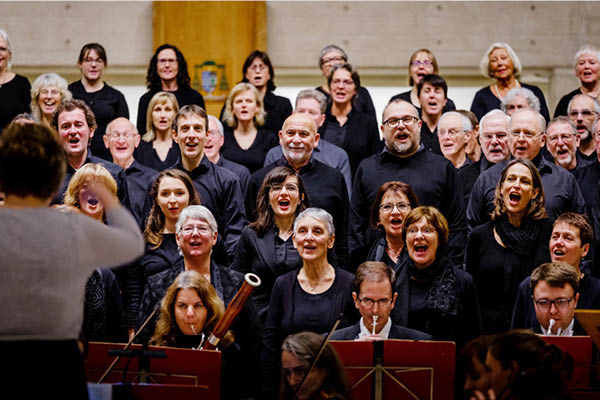Praise Him with Trumpets - Review!
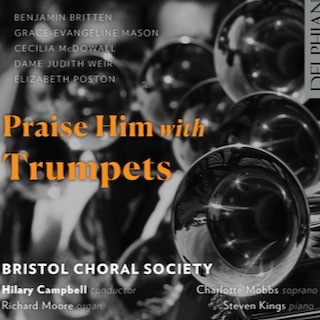
Bristol Choral Society, Charlotte Mobbs (s) / Hilary Campbell (dir) Delphian DCD34310
The substantial forces of Bristol Choral Society (BCS) stamp their authority on this interesting and demanding programme from the outset, with a very fine performance of Britten’s Rejoice in the Lamb, featuring accomplished step-out soloists from the choir and lots of contrasts in tone and volume. The team deserves great credit for finally bringing its second recording project to fruition, as Covid wreaked havoc with director Hilary Campbell’s careful plans, but it was well worth the effort. Shakespeare settings by Vaughan Williams, Elizabeth Maconchy and Cecilia McDowall, featuring soprano soloist Charlotte Mobbs, and Holst’s setting of Psalm CXVIII, complement three premiere recordings. Judith Weir’s Praise Him with Trumpets was written for the quincentenary of Hampton Court Palace and is appropriately jubilant. BCS gave the first performance of Grace-Evangeline Mason’s atmospheric A Memory of the Ocean, commissioned by the Royal Philharmonic Society with support from the Vaughan Williams Foundation to mark VW’s 150th anniversary year, and it relishes its elemental drama. The programme concludes with Elizabeth Poston’s Festal ‘Te Deum’, commissioned for the patronal festival of St Matthew’s Northampton in 1959, linking back to the Britten, which marked the same occasion at St Matthew’s in 1943. Recording this piece was a real ‘passion project’ for Campbell, and her choir produces a thrilling sound in the chapel of Bristol’s Clifton College.
****
Verdi Requiem: reviews
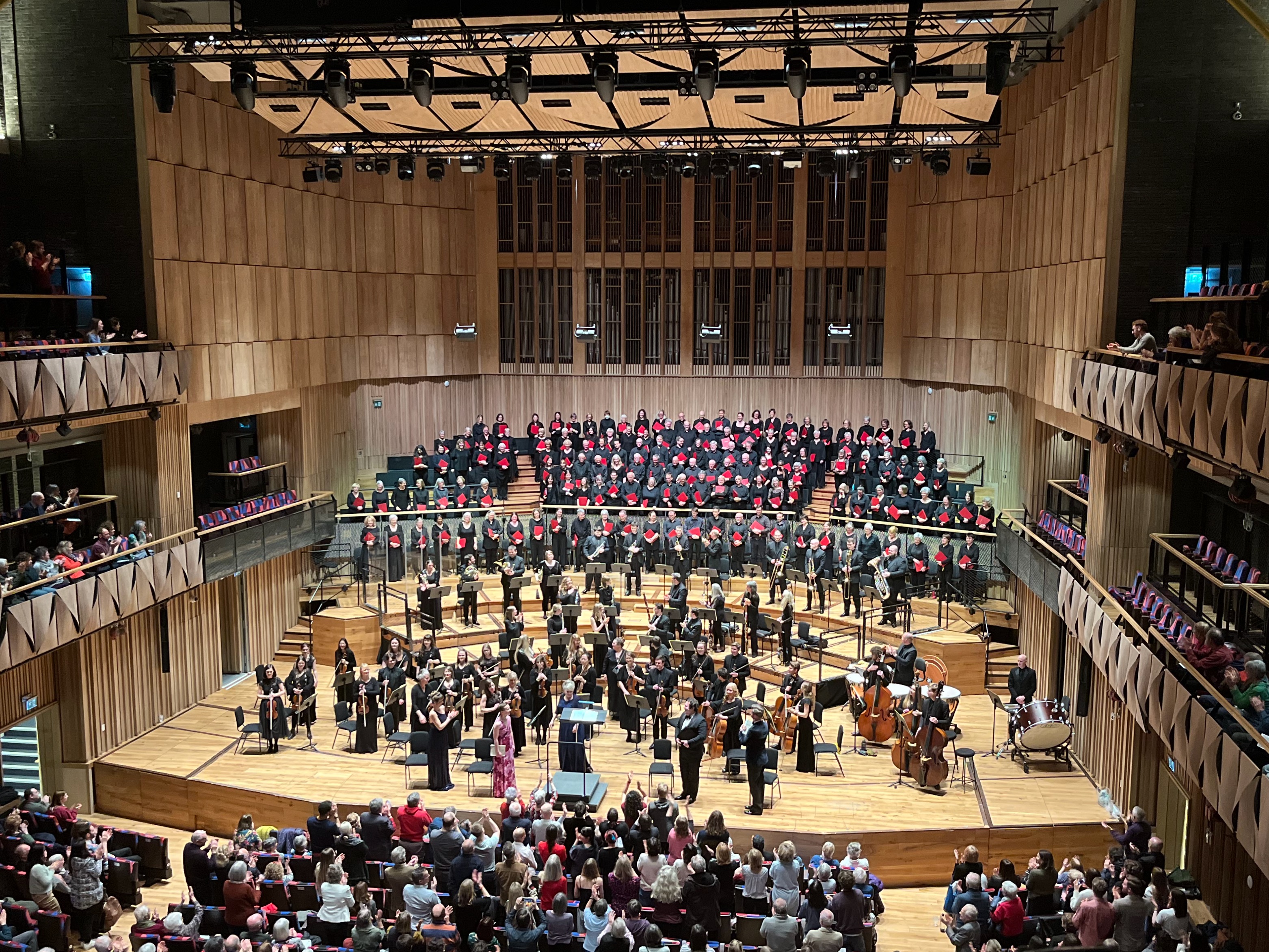
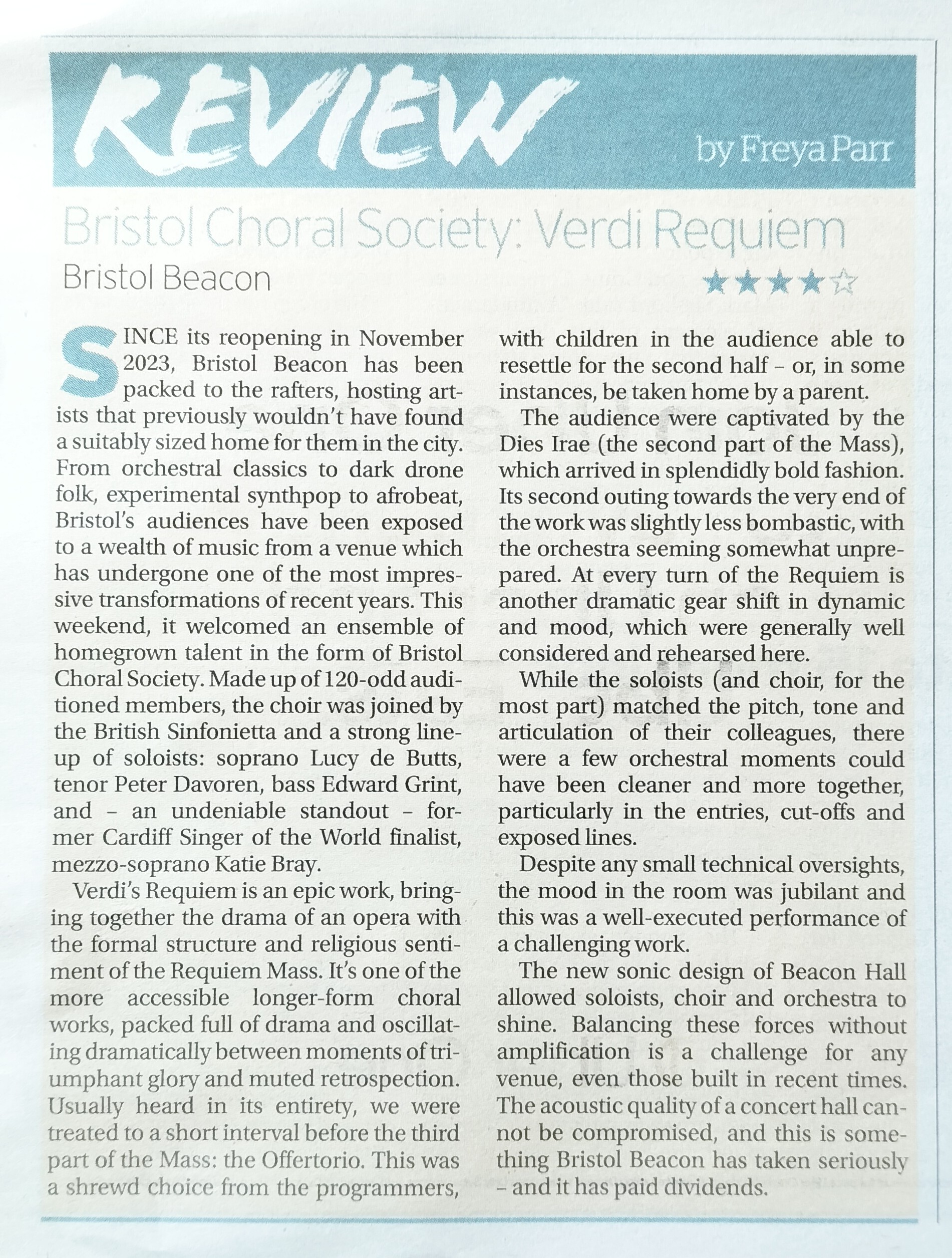
David Dewar
It was an honour to hear Bristol Choral Society last evening at the Bristol Beacon. I went with my wife, also a professional musician, and we were both sure that there would be a special atmosphere, having heard the choir sing Messiah last December. We were not disappointed. (Even though a drenching from just opposite the Beacon caused one to steam a little at the start of the concert.)
To the performance, then. The choir discipline in sits and stands in unison is pleasing, and, as far as I could see, members of the choir were enjoying the atmosphere with a sense of anticipation similar to the audience near us (G24,25 in the stalls).
The orchestral tone and ensemble in the opening movement was delectable, and heralded many riches to come. There is more to say in due course. It may have been just me, but I detected a slight hesitation at the il più piano possibile vocal entry? It is, of course, notoriously difficult, but actually set the bounds for the choral dynamic after a few slight intonation mishits. This, at the start of a long work, is almost inevitable and certainly did not detract in any sense.
As someone who has studied this score in detail from a conducting point of view, and played 1st horn in it on several occasions, I was greatly impressed by many elements of this performance, choir, soloists, and orchestra – but, perhaps particularly, I applaud the choir’s vivacious tone production, its discipline, and especially the fact each time the Dies irae recurred its full, chattering effect was given the vital charge of energy it needs. (Around my wife and me, several audience members jumped – perhaps a banal thing to notice, but to my mind that, amongst other things, shows the whole ensemble’s commitment to Verdi’s operatic vision.) The whole was given the urgency which the music needs.
Turning to the soloists, it would be hard to find a more engaged and engaging quartet. Each voice was distinct in timbre, fluent in diction, and able to articulate both the meaning and the drama of the work. More than this, they were appropriately beguiling as Verdi’s writing moved into the more intimate expressions of the piece.
I have not yet had the pleasure of being on the Beacon stage myself, but from the firm and assured playing of the orchestra I would imagine it to be a very pleasant experience. Although it did not seem to cause the choir too much of a problem, to me the lighting, especially for the back rows of the choir, seemed rather dim and perhaps made reading the score somewhat awkward.
However, it would be hard to find such an accomplished orchestra from a totally scratch combination of players, as is often the case for choral performances – the fact that this orchestra has many players who frequently work together meant that the music was given full range from beguiling delicacy to apocalyptic revelation. All sections of the orchestra participated in this triumph – and, to mention just one instrument, it is not all that often that a gran cassa is quite so sonorous and loud!
To sum up, this was a generous and thrilling concert. We certainly enjoyed it – and appreciated the enthusiasm evident at the end in the choir; we also felt that the standing ovation for all musicians was thoroughly deserved. A large part of this is that the enthusiasm and joy in singing was so evident. Thank you all, and the two of us look forward to the chance to hear you again!
Handel's messiah: a review
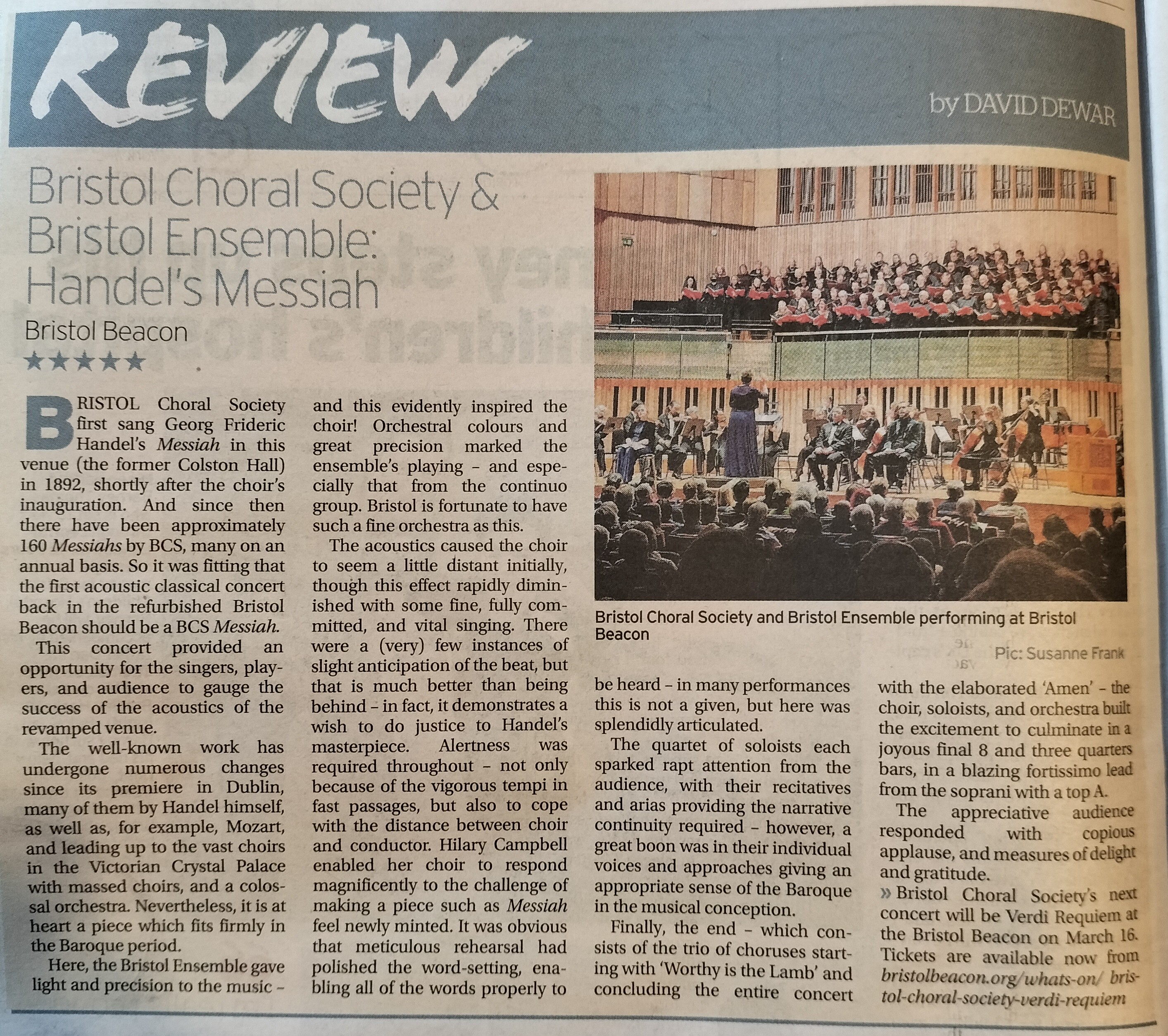
Bristol Beacon: Saturday 16 December 2023
a memory of the ocean: a review
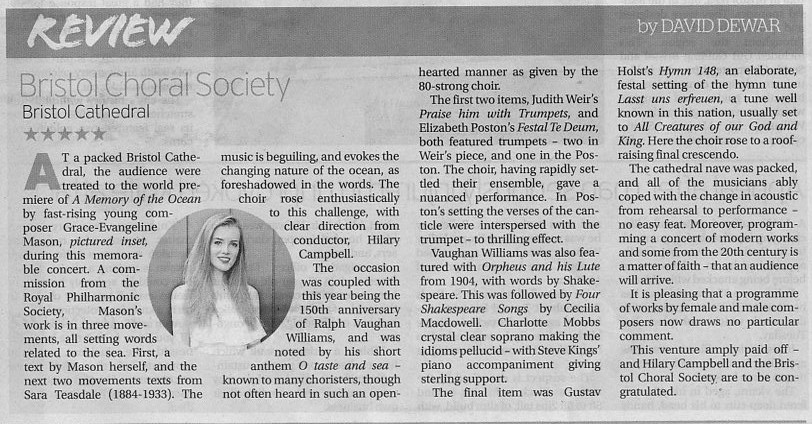
Bristol Cathedral: Saturday 24 June 2023
Stravinsky A Symphony of pslams
and fauré's Requiem:A Review
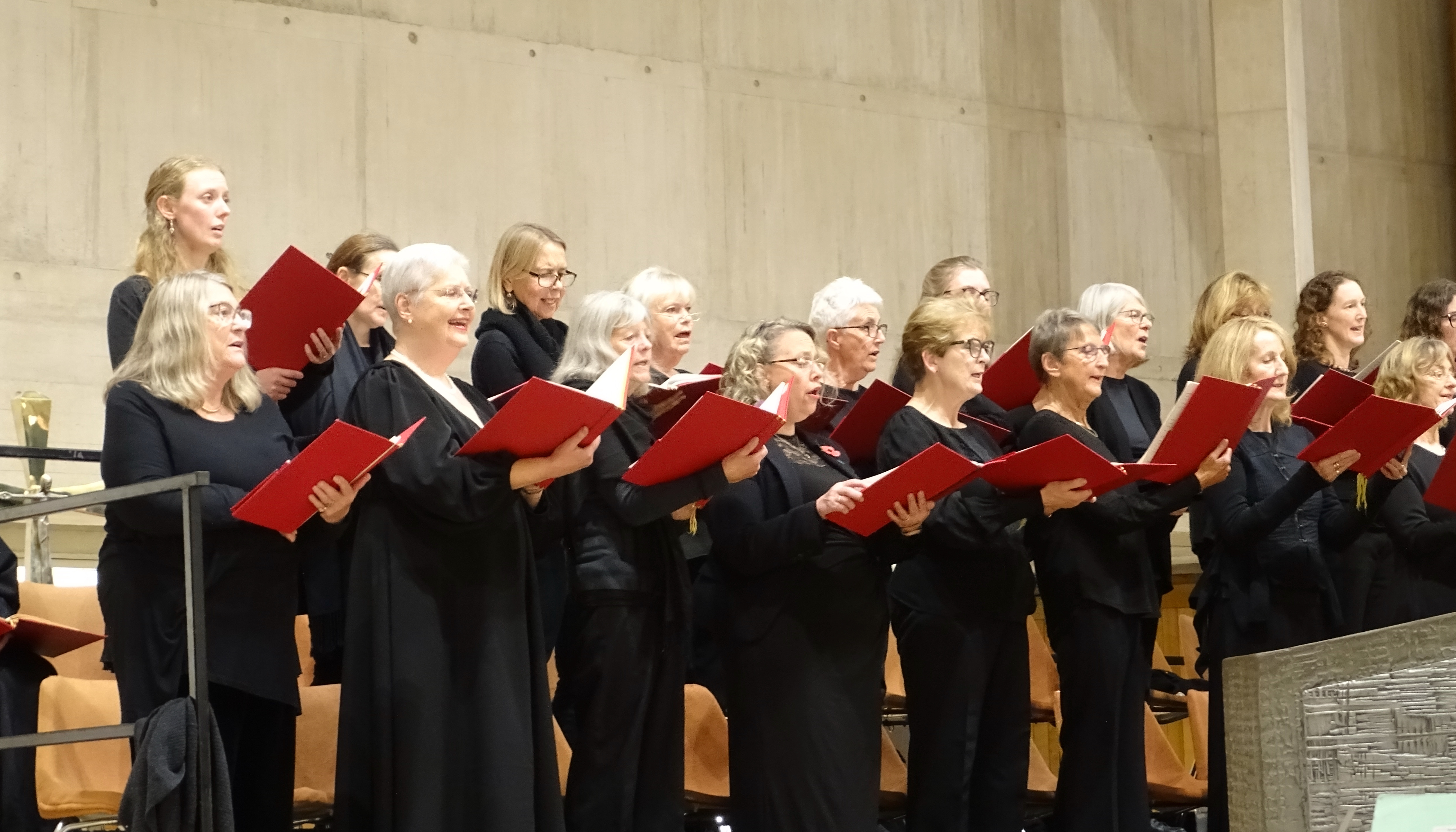
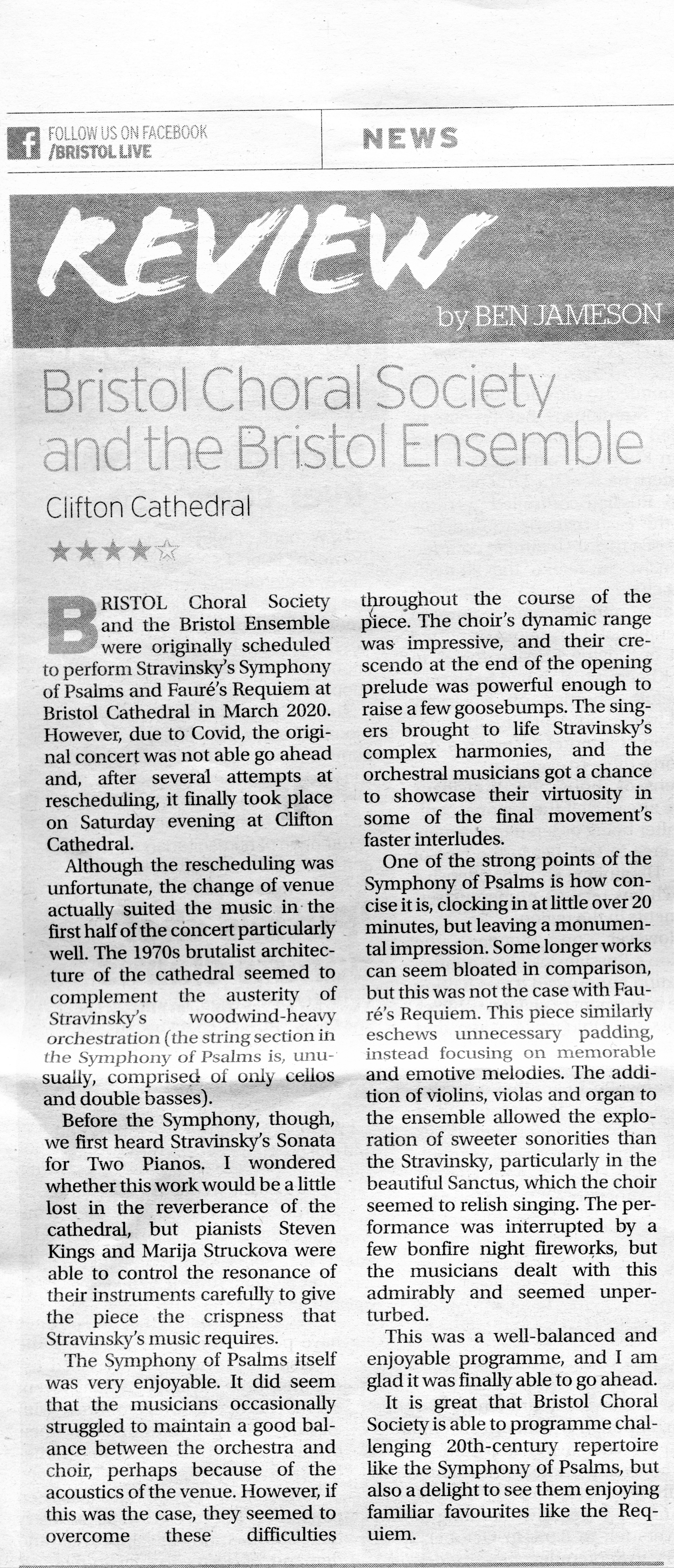
Clifton Cathedral: 5th November 2023
schubert mass in a flat: A Review
Bristol Cathedral: Saturday 11 June 2022
Mozart treasures: A Review
Bristol Cathedral: Saturday, 26th March 2022
Bristol Choral Society is by no means your typical massed choir. Under the enterprising musical leadership of their conductor, Hilary Campbell, they have bounced back from lockdown with aplomb and should be congratulated on their perseverance and sustained online music-making during months of self-isolation, when many other singing groups have gone into abeyance. It is no surprise that in the past year the choir has won both Making Music and PRS awards. They also pioneer interesting approaches to programming and recruitment, as evidenced by their last concert when they performed the first part of Handel’s Messiah without scores, and by their imaginative choral scholar scheme which encourages aspiring young professional singers to join with the incentive of bursaries and occasional solo spots.
It was armed with this knowledge that I attended their all-Mozart concert last Saturday at Bristol Cathedral when the choir were accompanied by the British Sinfonietta (not to be confused with the Britten Sinfonia!). The programme comprised popular works such as Mozart’s Coronation Mass and motet Ave Verum Corpus alongside the less frequently performed Alma Dei Creatoris and Regina Coeli, which Mozart wrote as a teenager. It was interesting to hear the lesser-known works, although I felt at times that the detail of the orchestral playing and choruses in the faster passages got lost in the cavernous acoustics of the cathedral.
For me, the highlight of the evening was Ave Verum Corpus, delivered with effective simplicity by the choir, singing entirely from memory with lovely sustained tone and carefully paced dynamics. The choristers are to be commended in general on looking up from their scores during the entire performance, this really makes a difference to the audience experience and transforms the sound.
The programme concluded with Mozart’s Mass in C Major, arguably his most famous shorter mass setting, written and premiered in Salzburg in 1779. It acquired the ‘Coronation’ epithet in the early nineteenth century as by then it had become the preferred choice for imperial coronations. Indeed the work is magisterial in its scope, and the choir and orchestra certainly rose to the challenge of conveying the grandeur of the piece amidst the soaring pillars of the cathedral. All of the soloists were on top form, with soprano Frances Israel providing dramatic coloratura in both the Regina Coeli and Agnus Dei from the mass.
I look forward to hearing more from the Bristol Choral Society. Their next dates are a ‘Come and Sing’ workshop to celebrate the Platinum Jubilee with Parry’s “I was Glad” in April followed by a performance of Schubert’s Mass in A Flat in June. From a personal point of view, I would like to hear them singing more unaccompanied music, which I think would play to their strengths.
Samir Savant
CEO, St George’s Bristol
(Photo: Barbara Evripidou/FirstAvenuePhotography.com)
The Messiah: A Review
Bristol Cathedral: Saturday, 11th December, 2021
The Bristol Choral Society and the Bristol Ensemble
One of the features of British life for over 200 years has been pre Christmas performances of George Frideric Handel’s Messiah. Handel was born in 1685, grew up and trained in Germany, worked as a composer in Germany and Italy, before coming to work in the UK in 1710. Under the Brexit rules of today, he might have found that difficult, but in 1710 he had no problems. And, he knew at that time the future King of England, George 1st , because he was already the Kapellmeister to George, who was then the Elector of Hanover. Royal patronage (£200 p.a.) from Queen Anne in London brought Handel back to England in 1712. He stayed here until his death in 1759.
In England, Handel became a prolific and popular composer of many different types of music, including over 40 operas. He was a celebrity. In 1741, he wrote the music for the religious oratorio, Messiah, in just 24 days,. In 1742, he sailed from Neston, on the Wirral, near Liverpool, to Dublin, to give Messiah its first performances. Why Dublin ? Handel needed the money that was offered there. Handel was a shrewd and effective business man. In Dublin, he practiced the work on the organ of St. Mary’s Church on the Quays. The Church is now a well known café, bar and restaurant. Messiah was a big success in Dublin, was given in London in 1743, and is now performed worldwide, and year round.
Handel could return to Britain today, even under Brexit: in 1727 he became a British subject.
Bristol had its first Messiah performance in 1758. The December 11th 2021 Cathedral performance was part of an ongoing annual tradition here for at least 100 years. Led by Hilary Campbell, conducting the Choral Society choir, four soloists and the instruments of the Bristol Ensemble, there were two robust and exhilarating performances in the Bristol Cathedral on December 11th. Because of Covid-19, only Part One of Messiah’s three parts were given, but that was a very convincing experience. There was then a strong “bonus” performance of the famous Hallelujah Chorus at the end, bringing the audience to its feet in the time honoured fashion. It would have been nice to have had the powerful and complex final Amen too, to round off the evening, but that might have been too much for the Health and Safety rules.
I eagerly look forward to Christmas 2022, when we might hear the whole work.
Bernard Lane
The Mary Otty Carol composition competition: a review
All together now - online - for carols in memory of Mary
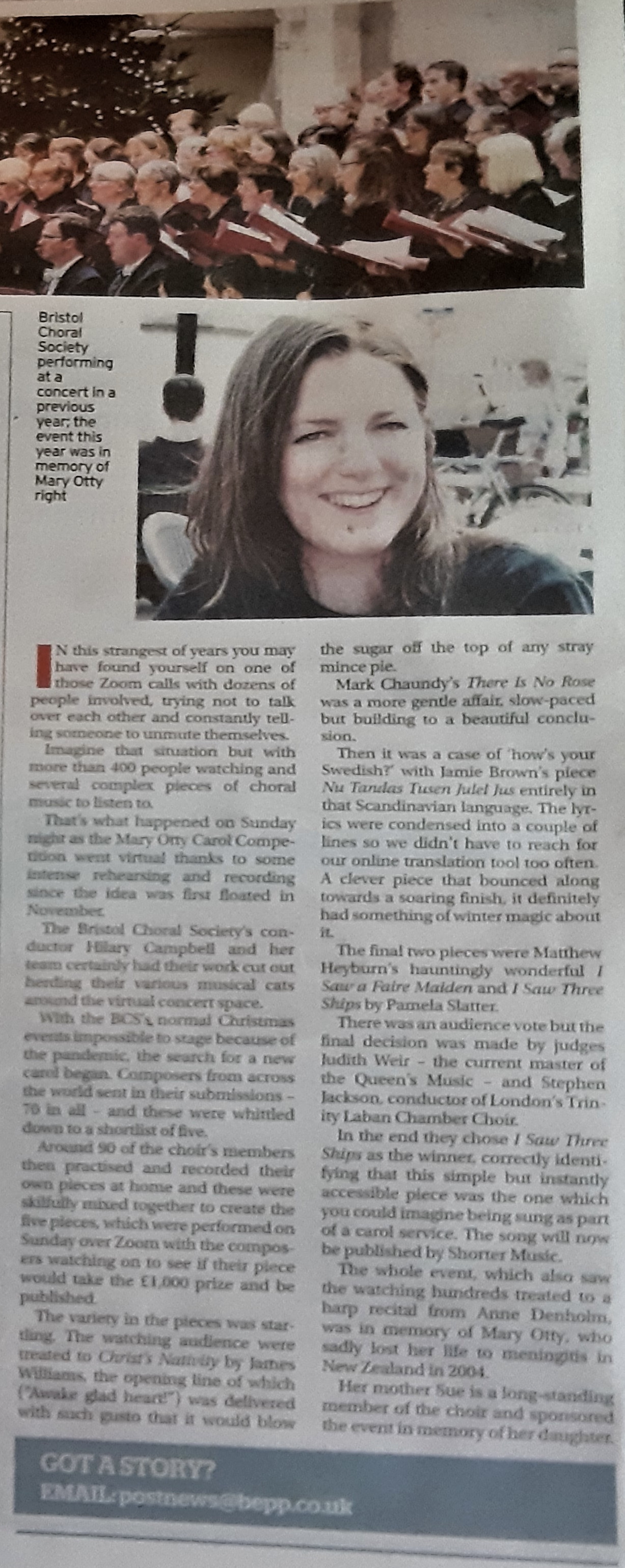
Bristol Post December 2020
a time for all seasons: a review
.jpg)
Bristol Cathedral: Saturday, 16 November 2019
The concert began with British Composer Award winner Cecilia MacDowell’s cantata A Time for All Seasons, which set a well-known text from the book of Ecclesiastes (‘to everything there is a season…’) alongside a contemporary reflection by Kevin Crossley-Holland. The piece created effective contrasts between the biblical text, which inhabited a brighter sound world, and the modern insertions, which explored darker themes and occasional dissonant harmonies. These were paired with knotty, often jazz-influenced writing for the piano accompaniment, ably performed here by Ian Tindale, and occasional percussion flourishes. The younger voices of Bristol Youth Choir provided commentary on the text and allowed the exploration of spatial effects within the resonant acoustic of the cathedral, while soprano Nina Bennet handled the more intimate moments for solo voice. These varied forces were well coordinated by conductor Hilary Campbell, and some of the most engaging sections of the piece were those that explored the interaction between the different groups of voices and instruments.
The programme then moved on to a composer who has become a minor celebrity in the choral music world. Eric Whitacre has become well-known both for his use of closely spaced ‘cluster’ harmonies and for his flowing mane of blonde hair. We first heard two short percussion pieces of his (performed by Oliver Butterworth and Oliver Pooley), before two of his best-known choral works, Water Night and Cloudburst, which both set texts by Mexican poet Octavio Paz. These two pieces provided the best opportunities of the evening to hear Bristol Choral Society’s sound largely unadorned by instrumental accompaniment or other supplementary voices (although the use of piano and percussion, including handbells and body percussion played by the members of the choir, in the finale of the latter work was rather evocative). They exhibited a warm, well-balanced choral sound, well-suited to Whitacre’s dense, sustained sonorities and the cathedral’s acoustic. They made effective use of a wide range of dynamics, which helped to give the works a sense of direction and shape.
The second half of the concert opened with a short performance (by Ian Tindale and Annabel Thwaite) of a work for four hands piano by nineteenth-century American composer Edward MacDowell, before the evening concluded with Bob Chilcott’s The Songs and Cries of London Town. This work featured traditional tunes from various historical eras arranged for the choir, accompanied by chiming piano ostinatos and driving percussion. Bristol Youth Choir also returned to the stage to sing the familiar London Bells (‘oranges and lemons ring the bells of St Clemens…’) for the third movement. I found the most effective sections of this piece to be in the more reflective second and fourth movements, as the driving percussion of the first and final movements occasionally became a bit blurred in the reverberation of the cathedral. The pairing of folksy tunes with bell-like piano writing created an almost Christmassy atmosphere that may have had some audience members looking forward to upcoming carol concerts!
Bristol Choral Society’s effective handling of this contemporary repertoire bodes well for their upcoming performance of Stravinsky’s magnificent Symphony of Psalms and Fauré’s much-loved Requiem in March, to which I am very much looking forward. However, if you would like to hear them before then, they will also be performing excerpts from Handel’s Messiah at Redmaids School on 21 December – details can of course be found on their website (www.bristolchoral.co.uk).


